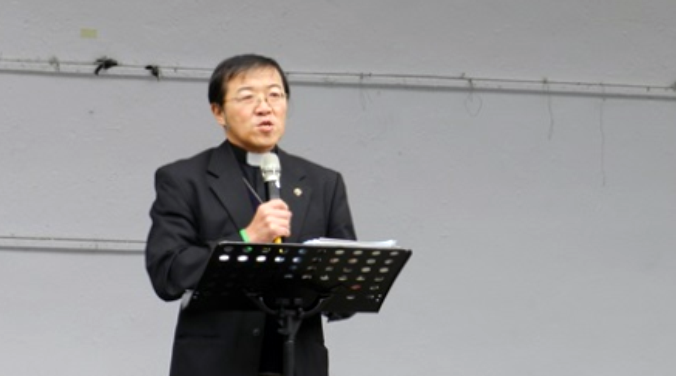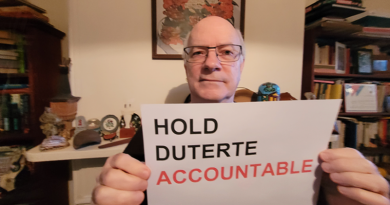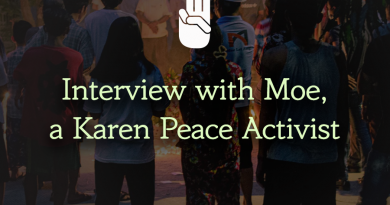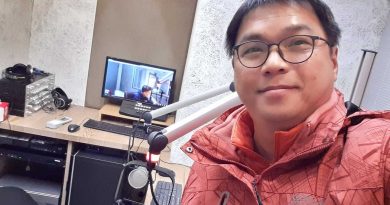Interview with Rev. Yin-Er Cheng, general secretary of the Taiwan United Nations Alliance
1. The political scientist 孫嘉業 wrote an article to 明報 that China would occupy Taiwan by 2027. What do you think about this scenario and what are the reaction of Taiwanese?
The Chinese Communists and its cohorts have been pitching such a menace since the 1990s, first citing the independence of Taiwan as a trigger and recently the landing of U.S. military aircraft on Taiwan. And alas, on June 6th there was a C-17 carrying 3 U.S. senators to Taipei.
This is not brushing aside the threat. Rather, the people of Taiwan have been fully aware of the military might and the hostile intentions of China as we have been facing it for decades. The Chinese even shot missiles in the waterway leading to two of our major ports right before the first democratic presidential election in the mid 90s. In the face of a global pandemic that is ravaging the whole world and China no less, the CCP tries to diverse its domestic pressure by talking up the possibility of a hostile take-over of Taiwan as it has always been for the past decades. Everytime the CCP leadership needs to stabilize the ship, it takes up the speaker and makes blatant intimidation.
Nevertheless, just like dealing with a bully at school, the best way to face him is not to silently succumb to the demands which would lead to more oppression, but to stand up and stand firm. As Taiwanese government has built up our national defense against military advances, we also strengthen our position by raising up our voice and seeking out allies of similar stance on the value of freedom and democracy, for together we can stand strong. That is also the very reason we TAIUNA has been advocating for the largest international organization in the world, the UN, to recognize and accept Taiwan as a member. The more bullish balderdash is cast upon us, the more resolute we are to defend our island nation. Thus we shall work harder on international cooperation on all fronts, especially here in East Asia, no matter there’s a timeline on the Chinese aggression agenda or not.
2. Victor Hsu said in his interview with us last year that as of 2019, 56.9 percent of Taiwan’s people consider themselves to be solely Taiwanese, with a further 36.5 percent identifying as both Taiwanese and Chinese. Has the rumor of the war and the continuing threat of China significantly changed this statistic?
Though there are few poll institutions with recognition of the public like the Pew center in the US, the Academia Sinica’s poll conducting, which Dr.Victor Hsu cited, is certainly on the top. It is yet to publish the 2020 results but there are noticeable shifts that can be observed in other polls. For example the one conducted by the Commonwealth magazine revealed that there is indeed a widening gap in Taiwanese society regarding national identity. What is astounding is that It is between generations rather than just ethnic groups as previously supposed by the sociologists and politicians. When asked about how one would identify him/herself, 61.9% identify themselves as solely Taiwanese and 28.3% as both Chinese and Taiwanese. But there’s a difference between age groups among those aged 20-29, 82.4% say they are Taiwanese, and merely 12.4% would identify themselves as both, whilst among those above 60 years old, the percentage is 55.8% and 29.7%. Upon being asked about pro-independence or pro-unification (with China), though most of people surveyed responded to remain “status quo” (58.1%) as previous poll results, 58.5% among aged 20-29 would opt for independence, whilst the percentage among those above 60s is only 21.8%.
As aforementioned, Taiwanese people are quite familiar with the Chinese threat of war which on the other hand has never been overlooked either. It goes without saying that we are aware and alerted of the menace, which might be a bluff but not a phantom.
Chinese fighter jets have been crossing into the Air Defense Identification Zone (ADIZ) over Taiwan Strait in an unprecedented frequency in 2020. The pestering presence is not only a contempt of sovereignty but also an attempt of provocation. Along with the minacious words that Chinese foreign ministry constantly spits out in the press, these all lead to Taiwanese people being further resolute in defending our nation and our freedom. On a poll conducted in May, 2020, when asked “Are you willing to fight for Taiwan if China makes a military advance upon Taiwan declaring independence?” 71.5% of people gave positive responses, jumping from 57.4% in 2019. That in every sense is a significant rise.
3. The Joe Biden government is succeeding Trump’s aggressive policy against China. What are the implications of this policy to Taiwan? And what are the civil society’s reactions to Biden’s policy?
There is a warfare that has been going on right now, not just in Taiwan but all over the world: The information war of fake news has been silently spread through the ever-reaching internet and has caused an ever-lasting impact worldwide. Due to the rise of social network sites, people are more likely to be heard of their opinion and in turn more likely be exposed to false information. Sadly, Taiwan is especially vulnerable to hazardous information because of the proximity of language to China. It has been evident that Chinese info war has become vigorously active in every aspect of Taiwanese networking sites. A lot of misleading information has been spread through on-line bulletin boards, social media, and most importantly, groups in the personal messaging apps like LINE. In the months leading to the US election in 2020, there were anonymous pages on Facebook posing as pro-Taiwan and posting lots of memes praising Trump and mocking Biden/Harris as well as the Democratic party. And they fervently posted about the so-called election fraud in the end of US election, citing words and photos of dubious origins, some of which were even copied from content farm sites operated by Chinese. Disturbingly, lots of DPP supporters that had been garnered by those pages also bought into the idea that Biden would lean towards China once he gets elected into office. Namely, they had become skeptical of the US support for Taiwan. The strange turn around of these pro-independence Taiwanese even caught the attention of US intelligence. But it must be emphasized that not all Taiwanese are swayed by those fanatical discourses.
The US democracy has been centuries old, though there might be flaws, the whole system is built upon a system rather than dictated by the will of a person or few. And as a long and well-functioning democracy, the US diplomacy policy is likewise not a ship that would be easily altered its course by one person nor in a month’s time. The US foreign policy has been turning towards Indo-Pacific for years, the foundation of which has begun since the Obama administration. Focusing on building a free and open Indo-Pacific region, the US tries to strengthen its ties in all areas in the region including economics, diplomacy, and military deployments. Trump might be a more out-spoken leader but the general strategy would not shift away much in the Biden era.
President Tsai Iing-wen’s administration has made great strides in the US-Taiwan relationship. And though there were some doubts from some of the supporters for the aforementioned reason, it has been cast away by the generous and clear gesture of three US senators landing in Taipei on an US Air-force C-17 announcing the coming arrival of thousands of vaccines against the pandemic which is firmly believed to be originating from China. The Taiwanese general public is greatly encouraged by such an obvious act showing the solid US support of the general value of freedom, democracy as well as Taiwan.
4. There are many media reports that Biden government is try to strengthen military and economic tie with Taiwan. Do you think that this move of the US will contribute to peace-building in Taiwan as well as North East Asia? How can we Korean civil society express our solidarity with your people?
As I said in the previous section, the Biden administration’s engagement in East Asia is a continuation of US diplomatic policy that has been going for years and years to come. Regional and global peace can be better achieved by cooperation rather than coercion, and thus the Chinese bid of supremacy over the region (and the world) won’t be realized unless they embrace the idea of freedom and democracy. The US, acting in accordance with the Taiwan Relations Act of 1979, is supporting Taiwan for the capacity to defend itself against a neighbor who always speaks out loud of invasion and never gives up aggression of any sort.
Part of the Chinese government propaganda campaign is to label the US continuing support of Taiwan as an Imperialist intervention. This pandemic in itself nevertheless debunked such contorted rhetoric: the origin as well as the wide-spread of the pandemic were the result of the lack of transparency and international cooperation. On the other hand, the US has shown constructive engagement by openness and innovation by thousands of doses of vaccines that are produced in a record time. These are all telling examples of the values, rather than just countries, that we stand with.
The attention towards Taiwan and regional peace is also shared by other leading economies around the world. The G7 summit held in Cornwall, U.K. this year marks the first official meeting South Korea is invited to, along with Japan and Australia,henceforth the importance of peace in Western Pacific is without doubt a key issue. Furthermore, after the G7 summit on June 13th, the Group of Seven concluded by issuing a communiqué that calls for peaceful resolution of cross Taiwan Strait issues.
It can’t be stressed more that the current predicament of Taiwan is a warfare that is ravaging through minds rather than guns. Due to the proximity of the language, Taiwan has been critically plagued by the malicious information implanted via various channels including newspapers, TV talk shows, social networking sites and even messaging apps. To make things worse, there are a lot of collaborators here speaking on behalf of instigators. In January 2020, at the beginning stage of the pandemic, the Taiwan authority identified the masks as a critical commodity in the fight against the pandemic, decided to boost up the domestic production of facial masks and put an embargo on masks. Immediately there were TV celebrities making foul cries over such embargo, calling it inhumane and even labeling the top official “a beast less than a pig.” The opposition KMT party of course has shown its continuing support of Chinese cause in every possible means: calling for Chinese vaccines, accusing the lack of vaccines and dubbing the support insufficient after the Japanese and US announced their vaccine sharing. There has never been a shortage of vile and venomous information going around in Taiwan trying to sabotage peace and justice.
And the instigators also try to bring warfare to the global opinion arena as well. The Chinese attempt to control opinions about Taiwan has become acute in their policing of the supposedly free internet. In 2016 a young Taiwanese member, Chou Tzuyu, of the K-pop girl band TWICE was forced to apologize for waving a Taiwan national flag on a Korean TV show. In an apology video released on JYP Entertainment’s official YouTube channel, Tzuyu was evidently stressed. More recently, the wrestler turned actor John Cena also apologized in a video for calling Taiwan a country in an interview. And he did that in Mandarin. These are all results of Chinese netizens under wilful direction swarming to bully the celebrities once considered outside of the political realm. Thus it is crucial to show support of Taiwan on the internet, in SNS or forums, so as to stop the malicious slandering and bullying by standing up and posting correct info. There were campaigns to support Taiwan with handlers such as #VivaTaiwan, #FreedomPineApple, and #TweetForTaiwan last year. All showed great positive feedback and encouragement to Taiwanese cause. Another good way to show support is to take short videos of encouragement to people of Taiwan and post them on public sharing sites. These actions might seem small in comparison to the might of the two countries with the most GDP in the world. But by drips and drops it shall roam and roar like a river, cleansing the shores as it runs. That will be a great support to Taiwan.




